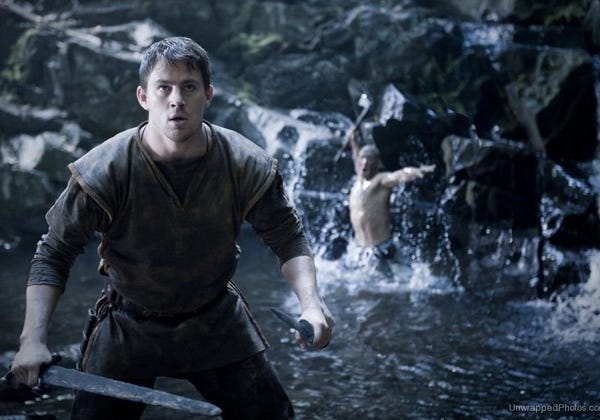The Eagle

Exclamation points and question marks turn up in subtitled dialogue of “The Eagle.” Periods? Not so much, but there’s already enough short, declarative simplicity to the throwback tone and structure of this Roman-Empire adventure.
Save the gore, this lean-budgeted production could easily have come from the same era as its 1954 source novel — stoic, steadfast, somber and (mostly) skimpy on silliness.
And were this a blockbuster, Channing Tatum and Jamie Bell would be last on a list of leads. Although they’re both beefy enough to dub this “The Last of the Bohunkans,” they’re more than just American steak and British fish & chips.
Many talented directors have lost their way in such Roman wildernesses — including B-movie staple Neil Marshall with 2010’s manically misguided “Centurion.” Not so for Kevin Macdonald, briefly stepping away from his milieu of real-life reenactments (“Touching the Void”) and topical fiction (“The Last King of Scotland”).
“Scotland” co-writer Jeremy Brock adapted “The Eagle” in a script that's both anthropological about the savage superstitions of combat culture and philosophical about how war’s gears grind up even the most idyllic notions of nationalism.
Before succumbing to a boilerplate ending, Brock uses “The Eagle’s” calm interludes to create character traits and compelling drama about caste systems and camaraderie — not just connective tissue to shattered cartilage and bashed brains.
Set in 140 A.D., “The Eagle” takes place 20 years after the unexplained disappearance in northern England of all 5,000 soldiers in Rome’s Ninth Legion. With them vanished the Eagle — a golden symbol of Rome’s war-machine achievements.
This humiliating loss, the film suggests, prompted Rome to erect Hadrian’s Wall — a fortification marking, at that time, the end of the “known” (read: civilized) world.
Marcus (Tatum) is the disgraced son of the centurion who led and lost those men — a soldier himself who takes no chances upon assuming command of a remote southern-England outpost.
“The Eagle” is at its most elaborate early — a nighttime ambush and chaos under the hood of a hulking mass of shielded soldiers shuffling forward a step at a time. But artistry and aesthetics are readily evident — employing subtle editing and sound design to suggest Marcus’s caution might be his downfall before all hell breaks loose.
It’s hard to believe Marcus could save his entire legion by toppling just one of several scythed chariots bearing down on them, but he does — severely injuring his leg and, to his deep dismay, earning an honorable discharge from service.
Often in the same sullen moment, Tatum conveys shame, heroism and foolishness. When Marcus runs into the business end of a billy club late in the film, it’s stupid but completely fitting. All Tatum must do is convince us of Marcus’s conviction, and he does so effectively. After all, there are worse things Tatum could grow into than another Dennis Quaid — like another Josh Hartnett.
Marcus knows his poorly sutured wound is a perfect excuse to exorcise him and his sullied name from the empire. He also knows about being consigned to what amounts to death after a valiant effort.
That’s why he spares Esca (Bell), a Briton slave forced into gladiatorial combat and later purchased for Marcus by his uncle Aquila (Donald Sutherland, showing his Canadian roots by droppin’ vowels like everyone was doin’ in the second century).
Esca’s father laid down his life to keep it from being usurped by Roman occupation, and that nobility of suicidal sacrifice before persecution looms large within him. So does his intolerance for men who turn tail and run when their fortune dips low.
Once Esca arrives, his fiery forthrightness forges a strong oppositional force with Marcus. In a sharply scripted exchange, he establishes that he, too, knows of wartime pain and pageantry just like Marcus.
Driven by rumors that the Eagle has been seen north of Hadrian’s Wall, Marcus tasks Esca for what seems a suicide mission to reclaim the idol, and Marcus’s honor, for Rome. While struggling to resolve cultural differences, Marcus and Esca discover another form of imperial indoctrination brewing over the wall.
Macdonald’s eye for harsh, humbling terrain recalls “Void,” and “The Eagle” is about as handsomely mounted a movie that $20 million can buy. Yet, for all of its many unanticipated strengths, “The Eagle” peters out in a weak poof by its climax.
The same people who likely slaughtered Marcus’s men seem awfully susceptible to Esca’s flimsy third-act suggestion. Character actor du jour Mark Strong gets one good scene before he looks genuinely confused over whether he’s still on the “Robin Hood” set. And Atli Örvarsson’s score lays it on thick over a rather miraculous climactic recovery from sepsis.
“The Eagle” doesn’t soar, but it routes a good flight pattern somewhere between the majesty of Michael Mann’s “The Last of the Mohicans” and the mediocrity of Antoine Fuqua’s theatrical cut of “King Arthur.”
3.5 Yaps
